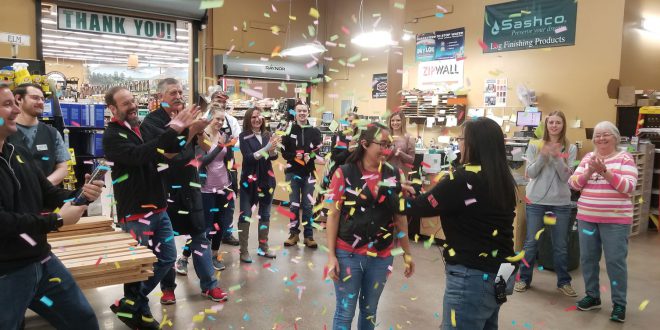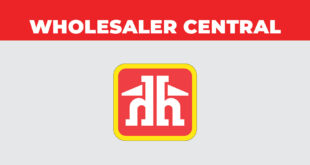When a customer walks through the doors of HomCo Lumber & Hardware in Flagstaff, Arizona, they know they won’t be passed from person to person to get an answer to their question. But this wasn’t always the case.
Over the last year, leaders of the operation made a point to invest in store associates’ success by providing a training program that combines salesfloor lessons with North American Retail Hardware Association (NRHA) training resources. All new hires are enrolled in the 8- to 12-week program, which is called The University of HomCo.
To learn more about how HomCo Lumber & Hardware’s training program has helped educate, empower and retain its hardworking associates, Hardware Retailing spoke with the store’s training coordinator, Cathleen Goff.
Hardware Retailing (HR): What’s your goal as training coordinator at HomCo Lumber & Hardware?
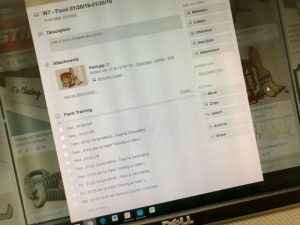
Cathleen Goff (CG): I’ve been with HomCo for three years now. When our former training coordinator left the company, I was approached to take over training by our chief operating officer, who thought my skills and personality would work well in this position. From my time working on the floor and listening to our associates talk over our radio system, I had some ideas that I wanted to implement to make training even better.
For example, we used to hire and train employees for specific departments, like paint or plumbing. This meant we had experts in these departments, but in a retail environment, those experts aren’t always in the store every shift,
which makes it difficult for employees to be able to help customers in every area of the business.
When I stepped in as the training coordinator, I wanted to create a plan that would ensure all employees were able to help customers no matter the department. In my opinion, offering a comprehensive training program shows our employees our commitment to their success, which in turn leads to better employees who are more engaged, feel valued and want to stay on board for the long haul.
HR: How did you develop this training program?
CG: Last year, as part of a management training retreat, we toured the Zappos headquarters. I was inspired by the investment Zappos makes in each employee. The results were astounding—long-term retention, high employee engagement and an overall sense of belonging.
People say, “Create a life that you don’t need a vacation from,” and I believe Zappos has created a work environment that supports that statement for their employees.
After that experience, I developed our program. I decided that in order for the program to really succeed and cover the entire store, it should last eight to 12 weeks. In addition, hiring and training sales associates for the entire store instead of a specific department just made more sense.
First, I watched and listened. Our program is broken down into individual weeks, and employees spend a few hours each week learning a specific module on the NRHA online training site, and we coincide that with hand- on training in the related department. I created the training schedule around the needs of the store. For example, the most assistance requests came from the service counter, so that’s the first stop for all new hires.
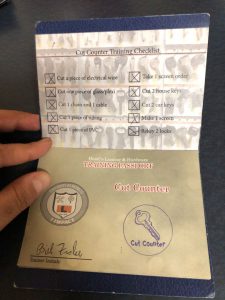
I often heard requests for key-cutting and screen orders, so the second stop is the cut counter. More challenging departments to learn, like plumbing, electrical, paint and building materials, are slated for the final weeks of training.
To show employees their progress and keep them motivated and accountable, we use a passport system. At the end of each week, the department lead will complete a questionnaire that overviews the new hire’s progress. This information is helpful during review week and determining the employee’s home department. I stamp their passport after they complete online and in-person training for each department.
If they complete their passport, we celebrate in the store with confetti and hang their certificate on the wall.
HR: What happens when an employee completes the program?
CG: The last week of the program, we have a week to review their progress, complete their exit training interview, revisit the questionnaires from the department leads and determine the employee’s home department. The exit training interview helps continue to improve the program. I also ask which three departments would be their top preferences. They aren’t always assigned to that department, but we keep their preferences in mind.
During their final week, we also have them take the DiSC personality assessment, which helps us determine which department they would mesh well with depending on the other personalities in those departments.
They’ll receive their employee discount at this point and get a new name badge that says sales associate instead of training associate.
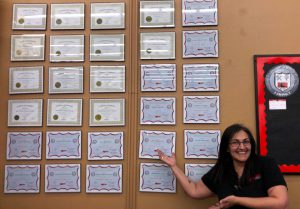
HR: How has your staff responded to the new training?
CG: After a few weeks of fine-tuning, it was well-received and so far, we have had 19 graduates finish the program. When we first started, we had a full roster of new employees, so it was helpful having a set system in place to train them and rotate them throughout the store. Our retention rate for new employees who have completed this program is over 90 percent since its inception last summer.
Now that we’ve slowed down on hiring, I’ve noticed an uptick in interest from current employees who have been here since before we started them program. We try to have one-on-one meetings with our employees on a frequent basis, and during those meetings, we see what we can do to help them. Many have asked about going through the program as well, which is rewarding to see them asking to participate and advance their knowledge.
HR: How does NRHA Training fit into this program?
CG: I assign specific times during shifts for NRHA online training, and then they use what they learned on the salesfloor. We provide headphones and space for them to learn online.
By scheduling time for them to train online, I know they’re processing and retaining the information. By the end of the week, they need to complete and pass the test for that department to move on to the next area of the store.
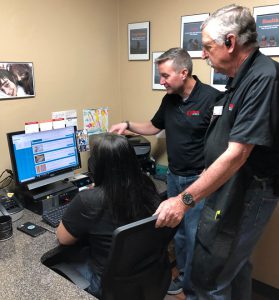
HR: What would you say to retailers who haven’t gotten into training or are considering creating a more cohesive training program?
CG: If you’re not training, you need to be! I think training is key for any independent retailer. You can’t expect your employees to know something if you don’t teach them. However, you can’t just implement training and leave it alone. I think the most important thing to do when you’re training is to set up a system to follow up and see if they’re doing it correctly or if they’re having any issues.
I encourage any retailer to look into using NRHA online training and any in-store training system you can. Listen to what your business needs are on the salesfloor and address those needs with training.
The best advice I think I can give is something Richard Branson has said. If you take care of your employees, they’ll take care of your customers. By investing in training your employees, you’ll see how your business grows. We’ve already seen it and our customers continue to tell us how great our customer service is.
 Hardware Retailing The Industry's Source for Insights and Information
Hardware Retailing The Industry's Source for Insights and Information



